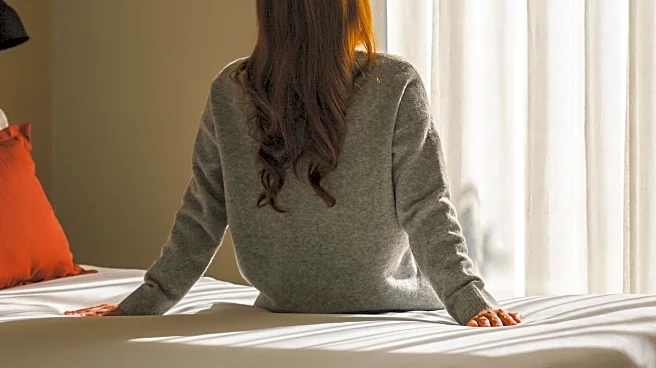What's Happening?
The concept of 'depression rooms' is gaining attention on social media, highlighting how depression can affect one's living space. These rooms, often cluttered and chaotic, reflect the mental state of individuals experiencing depressive episodes. Mental health professionals, including Dayton Olsen and Kobe Campbell, explain that these rooms are not a result of laziness but rather a manifestation of the internal struggles faced by those with depression. The cluttered environment mirrors the disorganization and heaviness felt internally, making it difficult for individuals to maintain their living spaces. Taisha Caldwell-Harvey emphasizes the feedback loop between thoughts, feelings, and behaviors, suggesting that cleaning these spaces can help break the cycle of negative emotions and behaviors associated with depression.
Why It's Important?
Understanding the concept of 'depression rooms' is crucial for recognizing the physical manifestations of mental health issues. This awareness can lead to more compassionate approaches to mental health care, emphasizing the need for support rather than judgment. By acknowledging the impact of environment on mental health, individuals and healthcare providers can better address the holistic needs of those suffering from depression. This perspective encourages small, manageable steps towards improving one's living space, which can contribute to overall mental well-being. The discussion around 'depression rooms' also helps destigmatize mental health struggles, promoting open conversations and encouraging those affected to seek help.
What's Next?
As the conversation around 'depression rooms' continues to grow, mental health professionals may develop new strategies to address the environmental aspects of depression. This could include therapeutic approaches that focus on behavior activation and environmental changes as part of treatment plans. Additionally, social media platforms may play a role in spreading awareness and providing support networks for individuals experiencing depression. The ongoing dialogue may also lead to increased research into the relationship between physical space and mental health, potentially influencing public policy and healthcare practices.
Beyond the Headlines
The concept of 'depression rooms' raises important ethical considerations about privacy and the portrayal of mental health issues on social media. While sharing experiences can foster community and support, it also risks glamorizing or trivializing serious conditions. Mental health advocates must balance raising awareness with ensuring respectful and accurate representations of depression. Furthermore, the focus on physical space as a reflection of mental health challenges traditional views of mental illness, encouraging a more integrated approach to treatment that considers both internal and external factors.









